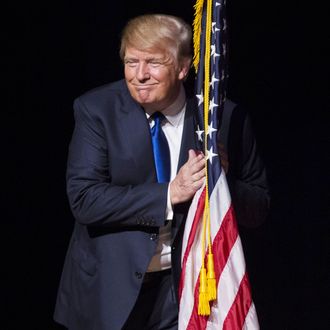
If there’s been a single consistent theme in the past 12 months of Donald Trump’s ramblings, it’s that America is the only place that matters. The GOP nominee has argued that on matters of foreign policy, trade, and immigration, the United States should set policy with only the welfare of its citizens in mind. If ripping up our security agreement with Japan forces them into a war with North Korea, so be it. If banning all Muslim refugees from our shores increases the burden of resettlement on our European allies, that’s not our problem. If a trade war with China immiserates some factory workers in Beijing, oh well.
And yet, one month before launching his campaign, the archenemy of political correctness told a room full of tea-party patriots that they shouldn’t call their country “exceptional” because that would hurt the feelings of Russian businessmen.
In late April 2015, the mogul spoke at an event hosted by Texas Patriots PAC titled “Celebrating the American Dream.” In a video of the event obtained by Mother Jones, Jim “Mattress Mack” McIngvale, a prominent local businessman, asks Trump, “Define American exceptionalism. Does American exceptionalism still exist? And what do we do to grow American exceptionalism?”
“I don’t like the term. I’ll be honest with you,” Trump replied. “People say, ‘Oh he’s not patriotic.’ Look, if I’m a Russian, or I’m a German, or I’m a person we do business with, why, you know, I don’t think it’s a very nice term. We’re exceptional; you’re not.”
Trump then offered a second reason why he rejected the term — one more in keeping with the messaging of the campaign to come.
“First of all, Germany is eating our lunch,” Trump said. “When I see these politicians get up [and say], ‘the American exceptionalism’ — we’re dying. We owe 18 trillion in debt. I’d like to make us exceptional. And I’d like to talk later instead of now.”
Make America Exceptional Again. This argument against the U.S. being a “shining city on a hill” — that Obama killed what made our hill so shiny — is more organic to the Trump campaign and conservative politics more broadly. But even when arguing for his America First trade policy, Trump kept decrying American exceptionalism with reference to the feelings of our overseas allies.
“First of all, I want to take everything back from the world that we’ve given them,” Trump continued. “We’ve given them so much. On top of taking it back, I don’t want to say, ‘We’re exceptional. We’re more exceptional.’ Because essentially we’re saying we’re more outstanding than you.”
Donald Trump: pro political correctness, anti bragging. It’s starting to look like the only unwavering aspect of the mogul’s political persona is intellectual inconsistency. (Or, all right: He has been pretty steadfast in his espousal of not-so-veiled racism, misogyny, and authoritarianism.)
But the single most heretical excerpt of Trump’s long answer was this: “I watch Obama every once in a while saying ‘American exceptionalism.’ It’s … I don’t like the term.”
One of the few redeeming features of the Trump campaign has been its penchant for negating the basic premises of conservative orthodoxy. As some of the mogul’s biggest supporters have repeatedly emphasized, Barack Obama (and his administration) never say that America is exceptional because he is a Kenyan anti-colonialist who hates the United States.
Trump is right, of course: Obama, like virtually every contemporary American political figure, has publicly affirmed American exceptionalism. And the mogul is also right, in a second sense: The foundations for the popular conception of American exceptionalism have crumbled. When every other Republican presidential candidate talks about American exceptionalism, they speak as though Britain is still governed by an all-powerful king and liberal democracy has yet to take hold in continental Europe.
“I live in an exceptional country where even the son of a bartender and a maid can have the same dreams and the same future as those who come from power and privilege,” Marco Rubio said in April 2015, ignoring that the U.S. lags far behind most western European nations in economic mobility.
But being right isn’t a virtue in Republican primary politics, and it’s odd that no rival GOP candidate ever surfaced this very public act of blasphemy.






























